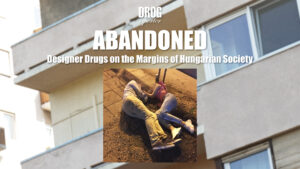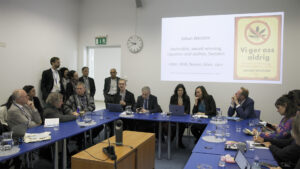Who are peers? Why is the involvement of peers crucial in service provision to people who use drugs and are in need? This short movie documents a study visit to Amsterdam and Antwerp, two cities with a long history of peer involvement.
In late 2019 – right before the Covid 19 pandemic hit the world – participants of the Peer2Peer project visited model programs in Antwerp and Amsterdam. They were there to learn how to make the cooperation between service providers and peers more effective, and to bring these effective methods to other countries, such as Poland, Greece, and Lithuania.
“[A] Peer is someone with a lived experience, who is coming from the community. This experience should be respected. It can be shared and should be shared with other stakeholders, because we could see that harm reduction services got more effective when they included peers, in particular paid peers by the services. Peers are a bridge, a linkage between health services, hospitals, and the street, and this cooperation is getting more and more effective because of peer work.” Said José Queiros, executive director of APDES, a Portuguese organisation which coordinates the European Union funded project Peer2Peer.
Marianna Iwulska – a peer worker from Prekursor, Poland – confirms the importance of involving peers in services: “I am working in peer support and harm reduction. With our involvement, we can connect to people who are without support and are outside of the system. People trust us more than other workers, that’s why we can do more, and act more than those who have no such background as us.“
The first visit of the Peer2Peer working group of professional service providers and peers from Portugal, Greece, Lithuania, Poland, and Belgium, was to the Free Clinic in Antwerp.
Free Clinic provides a range of services to marginalised groups, especially people who use drugs who live on the streets. They have shelters and a drop-in center that reaches 800 people and provides food, a place to relax, and harm reduction equipment. In the drop-in center, 55% of the workers are peers. They help with everything. They do the shopping, cook the daily soup, they grow their own vegetables and take care of their garden, they do outreach and the “syringe patrol” which collects discarded needles on the streets. Some of the workers are volunteers and as they gain experience they may become paid workers. After a while, should they wish, they can go and find other types of jobs, using their new skills and confidence. The program also provides computer skills, and it even has its own football team.
Free Clinic also has a unique program, called the “C Buddy Project”, which is run almost entirely by peers, with the support of nurses. Peers in this project are fundamental in reaching out to people who use drugs who live with hepatitis C, and connecting them to treatment and support. They help with hepatitis C information and screening, connect people with doctors and hospitals, and support people living with HCV throughout the whole treatment process. They visit them at the hospital, help them with shopping, and support them with any administrative issues. All of the peer workers in the C Buddy project have been cured from hepatitis C, and they have so far helped to cure another 240 people.
When visitors in the group asked about drug use regulations, the answer of Free Clinic workers was clear: Peers are not required to be abstinent, they are required to do their job right. If you are doing a good job with the clients, it is your own business what you do in your free time.
Tessa Windelinckx from Free Clinic explained that “Sometimes peers evolve and move on to do other jobs. With the experience they build up as a volunteer, as a coworker, and as a colleague, they can do different, new kinds of jobs”.
The next city visited by the Peer2Peer working group was Amsterdam, which has a long and rich history of harm reduction and peer involvement. They were invited to study AMOK, the drug consumption room (DCR) run by the De Regenboog Groep. It is one of the oldest drug consumption rooms in the Netherlands which provides a supervised and safer environment for drug consumption, with the aim of reducing overdoses, HIV and HCV infections, and public nuisance.
Cedric Charvet from AMOC explained that all three of these goals have been achieved by these DCRs all over the country. There has never been a lethal drug overdose in the buildings, and HIV prevalence has dropped significantly among people who use drugs in the Netherlands. In the late eighties there were 30 thousand people who injected drugs in the so-called ‘open drug scene’ in Amsterdam, but by now this ‘public nuisance’ has almost disappeared.
The DCR also provides showers, clothes, night shelter, food, internet access, and counseling possibilities. In many of these services, peers are involved. They help with the shelter, clothing area, they help buy and prepare the food, help with cleaning, and do all kinds of small jobs around the house. Peers also do paid jobs at the consumption room.
The approach to peer involvement is similar to what we had seen in Belgium. Cedric Charvet explained that “If any peer would work tomorrow here, and has to take methadone, I’m not interested about his life. That is private, this is public. It is private what the person does as long as he can function on top of his quality here.“
By including peers, especially properly paid peers in the development and implementation of services, the services improve and so does the life of the peers who are involved. As Christos Anastasiou from the Greek Network of People who Use Drugs told us: “Peers if they get involved, they change themselves. It’s an asset for them, and their lives, they become better and they can give this forward to other people too.“
The project was Funded by the European Union’s Justice Programme — Drugs Policy Initiatives.
István Gábor Takács
Rights Reporter Foundation
Drugreporter






